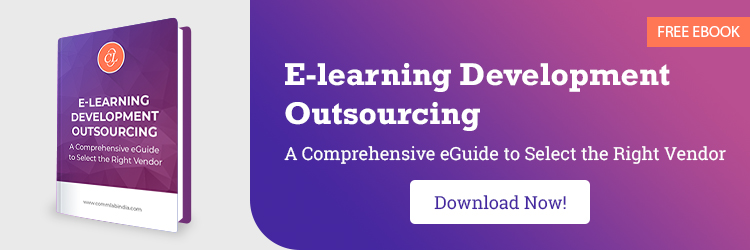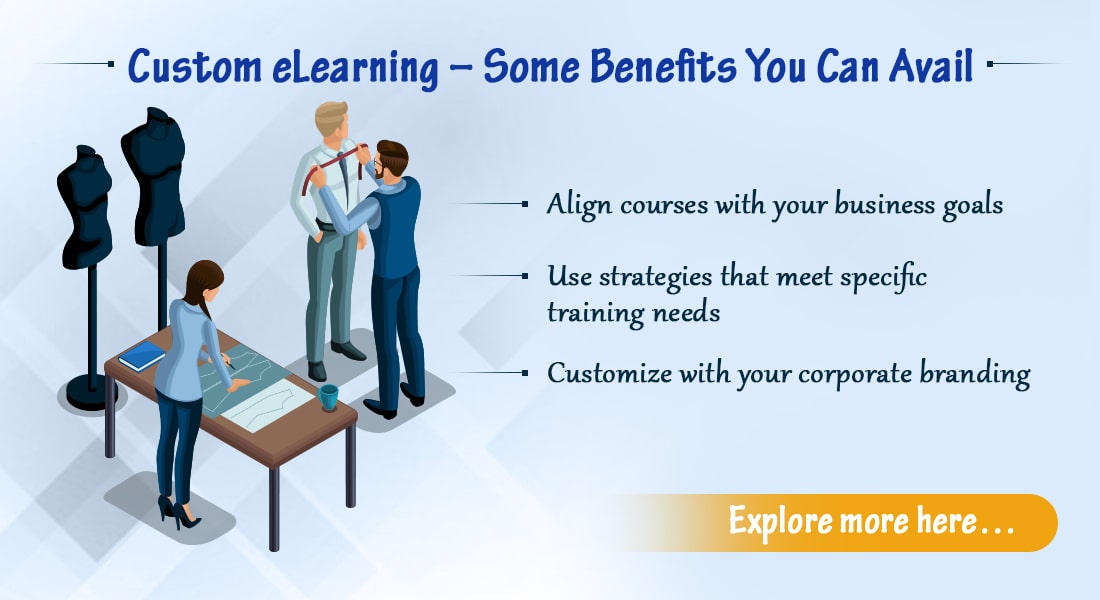If you’re a training manager who has just gone through a couple of difficult years because of the pandemic, you’re probably consideringswitching your training from classroom to eLearning(if you haven’t already done so!). Custom eLearning (especially Rapid eLearning) is quickly becoming the “go to” option, providing scalability without sacrificing on quality or innovation. Here are some numbers that validate this fact.
According to an IBM survey, firms that use eLearning might increase productivity by up to 50%. For every dollar spent on training, the organisation gains an estimated $30 in productivity. (Source:LinkedIn Learning)
The Research Institute of America concluded that eLearning boosts retention rates by 25-60%, compared to retention rates of 8-10% with traditional training. (Source:Forbes)
59% of L&D pros expect to spend more on online learning. (Source: LinkedIn’sWorkplace Learning Report)
Why Custom eLearning?
As a training manager, wouldn’t you want your eLearning courses to:
- Be designed specifically for your organization?
- Appeal to your learners and meet their specific learning needs?
- Have a long shelf-life?
- Be cost effective?
- Be easily updated without spending much time and money?
If you’ve answered, “Yes!” to these questions, custom eLearning is what you need. And you don’t need to waste time looking for off-the-shelf courses.
Explore how eLearning helps achieve your business goals.
So, What Exactly can you Accomplish with Custom eLearning?
Align employee training with the desired business outcomes of your organization
Corporate training is meant to maximize employee performance and competency, resulting in increased efficiency and productivity. Custom eLearning is the way to go because it allows you to align your training with the company’s specific business objectives.
Custom eLearning for Employee Training
It helps:
- Align employee training with desired business outcomes
- Save time and money
- Measure the impact of training
- Build corporate branding
Save both time and money
Custom eLearning offers a high return on investment. Courses can easily be updated and reused when there are new updates or changes in guidelines.Rapid eLearningauthoring tools which are used for developing eLearning courses also offer several templates and tools that can help you save on time.
Measure the impact of training with learning analytics
Once you’ve designed eLearning courses that are aligned with your company’s objectives, you’ll want to evaluate your training. The LMS is the best way to track the impact of training through learning analytics that can help you generate data on:
- Number of learners enrolled in each course (specific to the location)
- Total number of LMS logins
- Assessment results
- Completion rates
- Discussion board participation rates
Implement your corporate branding
When you choose custom eLearning, you can design courses taking care thateverything– from the logo to the colors and font styles –is alignedwith your organization’s branding. This will help increase brand recognition and create loyalty toward the brand in employees, as well as allowing learners to engage more with the training and promoting a learning culture in the organization.
When Should you Consider Custom eLearning Design & Development?
Custom eLearning will undoubtedly set your course apart from others. It does, however, require careful planning, a sizable initial investment, and significant development time. It’s a long-term commitment, and in the long run, you do get a lot of dividends and return on investments. So, it’s important to determine when to go with custom eLearning and when off-the-shelf solutions will suffice.
Custom eLearningis the way to go if you want to develop training that targets topics, products, or procedures that are unique to your company. You can use off-the-shelf courses for other types of training on general topics such as obligatory compliance training like POSH or fire safety.
Custom eLearning is a good option when the courses will be accessed regularly. Every year, the same custom eLearning course on onboarding can be delivered to thousands of newly hired employees. Custom eLearning is also ideal to create courses that have a long shelf life, and don’t require frequent updates..
There’s no denying that custom eLearning development takes time, given the amount of planning, content curation, design according toinstructional design principles和开发的into it. However, despite the time and effort required, it has lower maintenance costs, can be easily updated and enhanced, even in-house, is created for a specific audience and is specific to your organization.
Now that you have some idea about the ‘why’ and ‘when’ of custom eLearning development, let’s see how to get the most out of your investment.
How to get the Most out of Your Investment into Custom eLearning
Apart from what we’ve already discussed, a good eLearning vendor will also offer:
Translation services
If your company has a geographically dispersed workforce, providingtranslationsof your eLearning courses will help you connect with the learners and offer consistent training across the organization, helping them learn more effectively. A reputable custom eLearning provider will:
- Provide content translation into several languages
- Use the most recent versions of translation-friendly authoring tools
Conversion of legacy courses
Legacy courses developed in Flash or those created in earlier versions of authoring tools, may contain useful and relevant information that may be salvaged by converting them to HTML5.HTML5is not only mobile-friendly, but also works with the most recent versions of Internet Explorer, Mozilla Firefox, Google Chrome, and Safari browsers. You may also create mobile apps for course content that can be viewed both online and offline using HTML5.
Wrapping Up!
Custom eLearning may appear to be a complicated concept, but it’s pretty easy. And whatever effort it takes will be well worth it in the end. Outsourcing your requirements to a reputable custom eLearning vendor will make it even easier and faster. If your in-house L&D team doesn’t have the skills or time to develop your eLearning, you can always outsource it to a reputable provider. Here’s an eBook with everything you need to know about outsourcing eLearning design and development.






